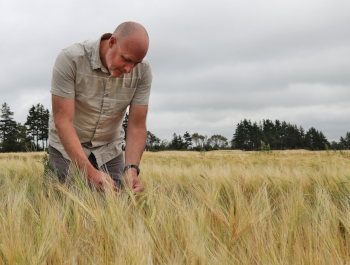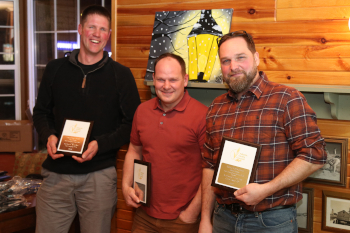
News
Farming Community
Yield Enhancement Network cultivates friendly competition – and results
June 15, 2023 By Agriculture and Agri-Food Canada
A cold day in February couldn’t curb the enthusiasm from Agriculture and Agri-Food Canada (AAFC), Atlantic Grains Council (AGC) and grain producers in the Maritimes as the highly popular Yield Enhancement Network (YEN) reflected on its fourth year.
Before the project began in 2019, AAFC research scientist Aaron Mills wouldn’t have believed how much it would take off. After a few new partnerships formed in its first year, YEN has expanded its reach to a total of 45 producers, participating across 98 fields in New Brunswick, Nova Scotia, and Prince Edward Island (P.E.I.). It’s even inspired a YEN to form in the Great Lakes region of southwestern Ontario.
“Honestly, we didn’t go in with any preconceived notions, other than hoping to create a large data pool and see some trends to help farmers. We didn’t anticipate the level of interest, enthusiasm and collaboration from farmers.”
Advertisement– Aaron Mills, research scientist, Agriculture and Agri-Food Canada
Perfecting the model
The YEN model helps researchers and farmers work more closely together in pursuit of higher yields by efficiently using the resources they have available (considering the amount of rain and sunlight each field receives every season). YEN encourages farmers to target what crops require at specific plant-growth stages to help them to reach full yield potential on their farms. The network also encourages participants to share their ideas and experiences for the maximum benefit of all participants.
“We’ve now started to figure out the factors that are driving yields on the east coast – what’s important and what’s not important. This knowledge has translated to a high level of sophistication from growers in terms of crop management.”
– Aaron Mills, research scientist, Agriculture and Agri-Food Canada

Aaron Mills checking the barley quality at the AAFC Harrington Research Farm. Photos courtesy of Agriculture and Agri-Food Canada.
The depth of knowledge and techniques gained through YEN is proving to be tremendously valuable for farmers, and since its inception, they have seen year-over-year increases to their yields. Mills believes that some farmers who are most attentive to the needs of their crops through YEN are now pushing towards their maximum yield potential. The hope is more participants can push those same boundaries of efficiency and profitability through the initiative.
“YEN helps inspire producers to innovate and try new things to improve their crops,” says Heather Russell, executive director, AGC. “More new varieties have been used, more disease management is happening and overall higher quality grain is being grown. YEN, Dr. Mills and the producers get to take a lot of credit for this.”
Those results are quickly getting the attention of other farmers. Producers are more likely to listen to their neighbours and one of the biggest parts of the project is knowledge transfer. Spencer Ellis, a farmer in O’Leary, P.E.I., was told about YEN from a couple participating farmers in 2019. “They were pretty excited about it,” says Ellis.
Having just recently gotten into growing cereal crops (spring wheat) with minimal knowledge in 2016, Ellis was interested in seeing how he could gain valuable expertise from other farmers and joined the YEN for the 2020 season. The changes he’s seen to his farm are remarkable and Ellis now grows spring wheat, winter wheat, barley, soybeans and corn.
“The collaboration has definitely helped to increase my yields,” says Ellis. “The first spring wheat crop I grew was pretty disappointing, but in the 2022 growing season, my farm average yield on spring wheat was over double what it was in 2016.”
The value of having access to key data analysis and a growing collaboration of farmers willing to share is not lost on Spencer.
“YEN opened my eyes and really made me think about factors like soil health, planting dates, seeding rates and timing on inputs like fertilizer. The results allow growers to see changes in yield in correlation with those factors. Collaborating with other growers is one of the biggest benefits of the YEN. It often takes a full growing season to see how your tweaks and changes correlate to yield benefits, so when you’re in with a group who are willing to share what they have done and the successes and failures they have had, that’s worth a lot.”
– Spencer Ellis, P.E.I. producer and YEN participant
Increasing collaboration through competition

YEN award winners Niels Langelaan (left), Joey Van De Riet and Chris Vissers at the 2023 year-end conference.
For the 2022 growing season, grain producers and researchers continued to collect data to assess soil health, soil nutrients and grain measurements to evaluate what was driving yields. Once again, producers went head-to-head for bragging rights to see who could achieve the highest crop yields while sharing on-farm experiences with their neighbours. In addition to the highest total yield and highest percentage of potential yield, a new award category was added for best nitrogen efficiency for farmers who were able to get the best yield while using the least amount of nitrogen fertilizer.
Spreading the wealth
Mills is quick to point out that it hasn’t been the same farmers winning awards each year – the wealth of YEN is being spread around evenly throughout the Maritimes as everyone continues to gain insight into maximizing their farm’s potential. After the first four years, Mills can’t help but be in a reflective mood on the enormous success of the project so far.
“We’re really proud of what this collaboration has become for farmers and scientists. It’s a well-oiled machine now,” says Mills.
YEN was originally a four-year project slated to end in March 2023, but with its overwhelming success, the hope is to extend it for at least another five years and continue spreading the word so that other grain farmers in the Maritimes can participate and benefit.
“Looking ahead, AGC is in the process of applying for the next five-year block of research funding, and YEN is a cornerstone of our application. Not only do we want to continue it, but we plan on expanding it to new crops, and to build new partnerships with the Ontario and Great Lakes YEN,” says Russell.
As the old adage says, if it isn’t broken, don’t fix it. In 2023, the YEN will add soybean to the mix, and potentially corn in the future – two crops that are growing in popularity in the Maritimes. But as for the network itself, other than looking to add new participants, the team will keep the same approach to data collection, analysis and the competition. The fact that farmers are “in it to win it” year after year is a testament to the true value of YEN.